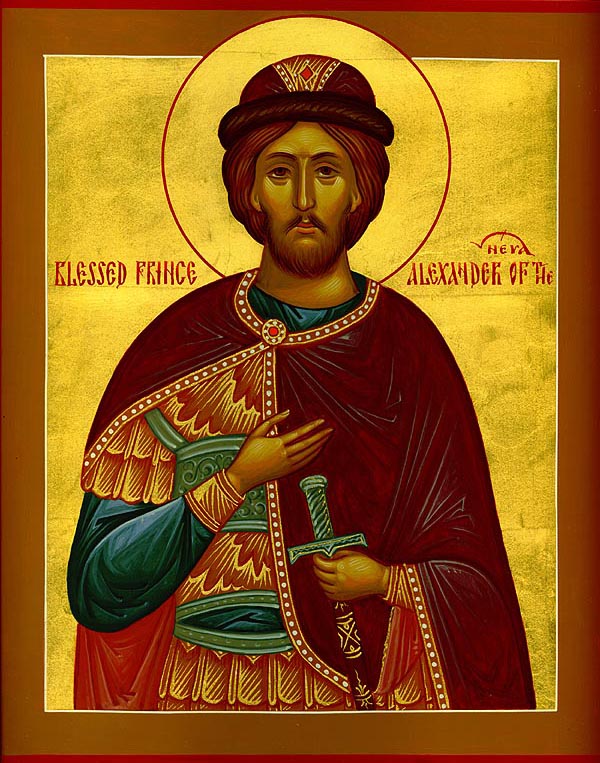Russia
In the 13th century Kieven Rus was overwhelmed by the Mongolian invasion. The Tatar Yoke fell over the land when Khan Batu, a grandson of the Mongolian conqueror Ghengis Khan, led the four hundred thousand horsemen of the Golden Horde into the Russian lands in 1237. The Kievan state collapsed in 1240.

In 1231 Alexander Nevsky (1219–1263) became the prince of Novgorod. This independent, large city-republic in the northwest had its own unique form of republican government, as well as its own particular spiritual, architectural, and iconographic traditions. In 1240, at the age of only 21, Alexander led the Russians in a victorious battle at the Neva River against the Roman Catholic Swedes, who were invading from the northwest at this moment of terrible crisis in Russia. In 1242 he led the successful resistance against another invading force from the West—this time, the Teutonic Knights from modern-day northern Germany, Lithuanian, and Latvia.
After these two brilliant victories, Alexander was pressured by many of his fellow Russian princes to raise up a counterattack against the Tatars. But he wisely understood that the Tatars were far too strong for the Russians to drive out. In addition, he knew that the Westerners were a much greater threat to the integrity of the Orthodox Church than were the Tatars, for the Swedes and the Germans would have imposed their Roman Catholicism upon the Russians, while the Tatars allowed the Church the freedom to carry on basically without restriction, and even with a certain amount of protection.
In 1247, Prince Alexander traveled to Khan Batu’s headquarters at Sarai, in the Volga Delta, humbly seeking mercy for the Russian people from the Tatars. Alexander agreed to pay annual tribute to the Khan in order to have peace for his people. He returned with the title of Grand Prince of Kiev, and the responsibility to assure that all the Russian princes paid the tribute money and remained subservient to the Tatars. Several times his fellow Russians tried to revolt, but each time the uprising was crushed by the Tatars, and each time Prince Alexander traveled to Sarai to beg the Khan that there be no further reprisals.
Alexander died in 1263 at the age of 44. In 1380 he was glorified as a saint by the Russian Church for his personal holiness, his military bravery, and his practical wisdom and diplomacy—all of which he dedicated selflessly to the service of his people as a true Christian statesman.
Saint Alexander Nevsky was ably supported by Metropolitan Cyril of Kiev (r. 1242–1281), a native Russian (nearly all the previous metropolitans of Kiev had been Greek). This cooperation between the grand prince and the metropolitan laid the foundation for the close Church-State relations that existed in Russia until the 20th century.
